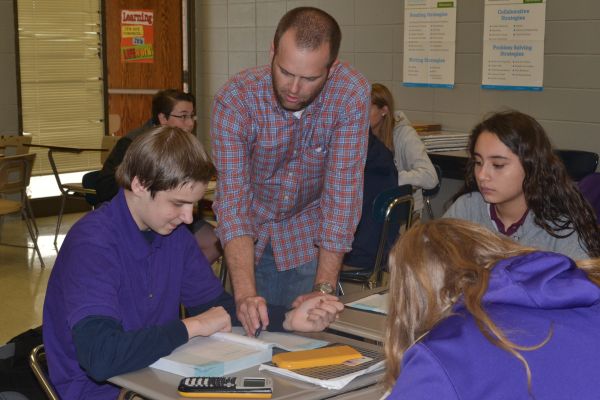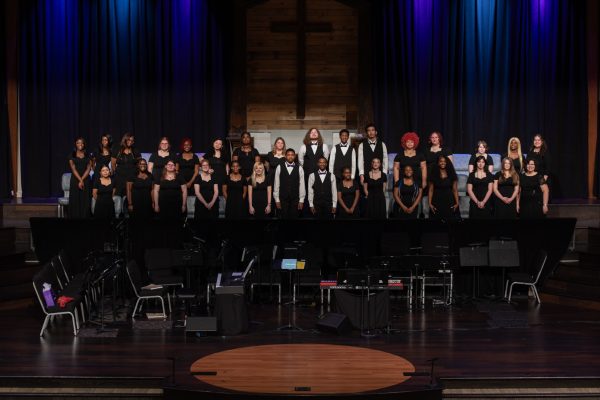Snyder Disagrees with ‘Experts’ Who Suggest Algebra I is Unnecessary for High School Students

MR. JEFFERY MULLINS HELPS STUDENTS UNDERSTAND THEIR ALGEBRA I ASSIGNMENT– One of Central’s Algebra I teachers, Mr. Mullins, helps students with their work after teaching a lesson.
October 3, 2016
The Real Numbers Systems, Arithmetics with Polynomials and Rational Expressions, Creating and Interpreting Equations, Reasoning with Inequalities and Equations, Interpreting and Building Functions, Linear, Quadratic, and Exponential Models, Completing Quadratic Equations, along with Slope and Intercepts are all explained and taught during the Algebra I course. Yet, if Andrew Hacker, a Professor Emeritus in the Department of Political Science at Queens College at New York, has his way, students would stop learning these principles and could skip Algebra I altogether.
In a 2012 article, “Is Algebra Necessary?” Hacker explains that algebra should not be made a required course as it discourages students to continue their education and contributes to the dropping out of students.
“There are many defenses of algebra and the virtue of learning it. Most of them sound reasonable on first hearing; many of them I once accepted. But the more I examine them, the clearer it seems that they are largely or wholly wrong- unsupported by research or evidence, or based on wishful logic,” said Hacker. “This debate matters. Making mathematics mandatory prevents us from discovering and developing young talent. In the interest of maintaining rigor, we are actually depleting our pool of brainpower. I say this as a writer and social scientist whose work relies heavily on the use of numbers. My aim is not to spare students from a difficult subject, but to call attention to the real problems we are causing by misdirecting precious resources.”
However, Mr. James Snyder, an Algebra I teacher at Central High School who has taught the class for seven years, disagrees.
“Professor Hacker claims that algebra is acting as a barrier towards discovering and developing new talents, but he discovering and developing of young talent comes through challenge, not elimination of challenge. Math moves with other subjects and expresses opportunity to develop logical thought processes and apply them to challenges,” commented Snyder.
Professor Hacker, along with a few other educators, continues on and cites algebra as the “major academic” reason for high school drop outs, one educator even warns, “to expect all students to master algebra will cause more students to drop out.” In addition to, Hacker adds, “Algebra is an onerous stumbling block for all kinds of students; disadvantaged and affluent, black and white.In New Mexico, 43 percent of white students fell below ‘proficient,’ along with 39 percent in Tennessee.”
Regarding the previous statements of Professor Hacker, along with the other educators, Snyder confutes passionately.
“To start off with, in all due respect, Professor Hacker gives out statistics proving the detrimental effects of Algebra which were obtained through algebraic means, so that already proves a part of my point,” explained Snyder. “The main cause of the difficulty of algebra in students is their lack of understanding of basic maths such as decimals, fractions, multiplication, division, and things of the like which are all utilized in Algebra I. If the student does not understand the basic concepts of math, then learning new concepts that build off of the basics will be difficult. The problem does not lie in Algebra I itself, but lies in the lack of understanding of basic mathematical concepts.”
Professor Hacker’s article continues by further discussing the pernicious effects of algebra on not only high school freshmen, but also the effects of algebra on college freshmen.
“California’s two university system, for instance, consider applications only from students who have taken three years of mathematics and in that way exclude many applicants who might excel in fields like art or history,” elucidated Professor Hacker. “A study of two-year schools found that fewer than a quarter of their entrants passed the algebra classes they were required to take.”
Snyder clears the misunderstanding of the higher education system.
“Universities are where students receive a ‘universal’ education, meaning that all subjects are covered and apply it in the future to a specialty (known or unknown, existing or yet to be created),” begins Snyder. “Not everyone needs or want a universal education; they could go to a specialty immediacy school where students learn only about their specialty, such as an acting school or an art school. The students there don’t need to see subjects that are considered irrelevant to their field.”
Hacker has found linkage between college drop-outs statistics and the effects of Algebra I on students.
“Another dropout statistic should cause equal chagrin. of all who embark on higher education, only 58 percent end up with bachelor’s degrees,” inaugurates Hacker. ” The main impediment to graduation: freshman math. The City University of New York, where I have taught since 1971, found that 57 percent of its students did not pass it’s mandated algebra course. A national sample of transcripts found mathematics had twice as many F’s and D’s compared as other subjects.”
Dr. Barabara Bonham, who is a Professor in the Higher Education Graduate Program, Department of Leadership and Educational Studies at Appalachian State University, Boone, NC somewhat agrees with these statistics.
“There are students taking these courses three, four, five times,” stated Bonham.
Concerning the dropout statistics Snyder explains as to why the standards are as they are.
“First off, most of the educators would also probably agree that there are other contribution factors to an individual student’s decision to leave the educational process. The educators blame it on ‘algebra’. I honestly believe that students who leave education have lost, or never gained, their personal belief that education is beneficial and worth the struggle,” phonates Snyder. “Higher education is like a filter for unrealistic occupations for some students. Some students realize that either they are not suited for the subject after going through a portion of what their intended major is composed of; if these students who are taking specific classes three to five times to succeed, they will find it difficulty to succeed in a work environment where the work processes change to increase productivity and owner profit. All work should include a growth element, if you do not have the tools to master new processes be prepared to be left behind. The high standards assist students in choosing the appropriate major for themselves through trial and error. The student will not know whether or not they are suited for the job unless they experience it for themselves, if they fail, that means that continuing the subject would not be of the best interest for them.”
Hacker recapitulates that although Algebra I should not be a required course, the basic numerical skills should be learned; he defines the basics as: decimals, ratios, estimating, and have a good grounding in arithmetics, which Snyder asserts as, “The basic skills present in the initial obstacle to a student’s success in algebra.”
“Everyone can and will benefit from learning algebra, even if it is not in your major. For example, even if you are an artist or novelist you still need algebra to calculate your expenses and manage your money. You need algebra to come up with credible statistics for political opinions or social analysis, it’s in music; algebra is rooted somewhere in almost any occupation, and is also apparent and applicable to everyday life,” clarifies Snyder. “In recent years, there is a movement centered around Heutagogy , self-directed study where you can craft your own education through MOOCS, Massive Open Online Classes. These enable adult learners to secure independent skills away from a traditional education environment to secure skills they see as important to their own development. I have talked to many parents who say, ‘I was never good in math, but I wish I was.’ They now recognize the connection and potential of the maths that they struggled with.”
Professor Hacker still believes students should be required to learn basic mathematics, but disagrees with the fact that schools require students to enroll in several advanced mathematical courses.
“Yes, young people should learn to read and write and do long division, whether they want to or not. But there is no reason to force them to grasp vectorial angles and discontinuous functions,” concludes Hacker. “Think of math as a huge boulder we make everyone pull, without assessing what all this pain achieves. So why require it, without alternatives or exceptions? Thus far I haven’t found a compelling answer.”
Mr. Snyder believes that students need to learn to take on challenges head-on.
“The key is not ‘eliminating the challenge’, but it is to make the benefits clear as to why the student should face the challenge, and position themselves to achieve their personal vision of themselves,” concluded James Snyder.







